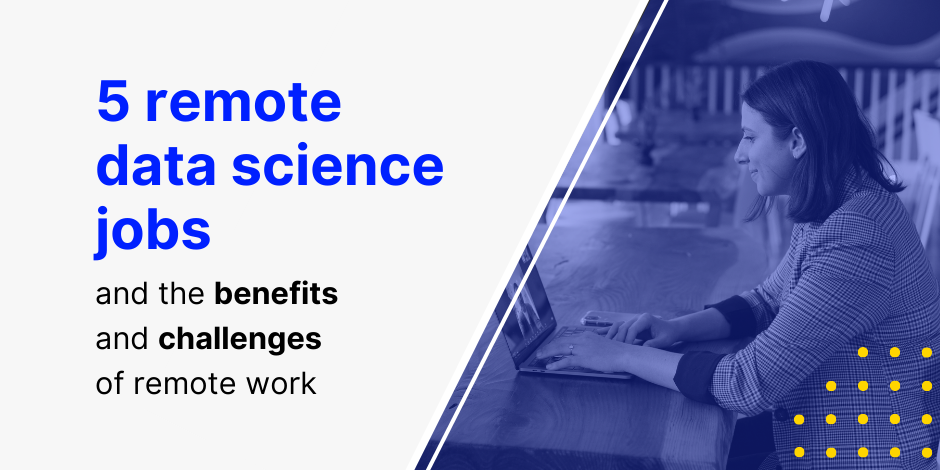5 Remote Data Science Jobs and the Benefits and Challenges of Remote Work

Stay Informed With Our Weekly Newsletter
Receive crucial updates on the ever-evolving landscape of technology and innovation.
The global shift towards a hybrid business model has seen thousands of people working from home, which has skyrocketed the opportunities for remote data science jobs.
The pandemic has altered nearly everyone’s views on remote working. According to one survey of 2100 respondents, 58% of workers would look for a new job if they could not continue remote working. An additional 31% said they were uncertain what they would do if they were not offered remote work options at the end of the pandemic.
Only 11% said it was not ideal.
Another survey by the Boston Consulting Group and The Network found that, in digital and knowledge-based fields, more than 90% expect to work from home at least part of the time after the pandemic. The survey questioned nearly 209,000 people in 190 countries.
If you’re interested in working as a remote data scientist, read on to find out more.
Are remote data science jobs an option?

Data scientists are often encouraged to work from home because most of the work takes place on a personal desktop or on a distributed system that can be accessed remotely. Plus, working with large amounts of data and dealing with intense coding and analytics requires minimal distractions, which is why remote data science jobs can be so beneficial.
What types of remote data science job tasks can be completed from home?
A variety of tasks can be done remotely as a data scientist. All you need is good internet connectivity, a reliable cloud-based work environment, and a location that induces productivity and creativity.
Here is a list of tasks that can be performed as a remote data scientist from anywhere around the world.
Statistical analysis to improve real-time decision systems
Identifying, researching and providing useful and actionable insights can be done effectively from home by using some of the best data collection tools for remote statisticians, such as Device Magic, Fulcrum and Magpi.
Presenting data
Communicating data insights and providing recommendations for technical or non-technical teams across borders via online communication tools such as Skype, Pukkateam and Loom.
Machine learning
Using pre-built tools, visuals and scripting language come in handy when working remotely as a machine-learning engineer.
What are the benefits and challenges of remote data science jobs?
It is always wise to consider the pros and cons of working remotely as a data science professional before committing yourself fully. Here are a few benefits of working from home.
Flexibility
Increased flexibility has almost always led to greater productivity. Not being bound by a set of time-frames can enable a sharper focus on the tasks at hand and successfully achieve goals within tight deadlines.
Better health and well-being

According to a study by PGi in 2014, 69% of remote workers reported lower absenteeism than non-remote employees and 80% reported high morale. Reducing travel hours helps to retain more time to have an active and healthy lifestyle, lowering overall stress levels.
Bringing out the best
Working in an environment that gives energy without distraction tends to increase motivation. Workers are more inclined to put their best foot forward and continue to outperform in return for living a better lifestyle.
Working remotely has its own set of challenges. It is completely opposite from working with a team in traditional offices.
Here are a few challenges of working independently.
Communication gap
The biggest barrier of remote data science jobs is communicating and collaborating with teams spread internationally across time zones. But greater numbers of digital nomads and communication and collaboration tools have made this easier to contend with. Use communication tools such as:
- Slack
- Trello
- Zoom
- GitHub
- Zapier
Isolation/loneliness
“To a certain extent, your co-workers are your social circle. Sometimes it is hard to explain to others that all your friends are online.” Cody Jones, Director of Partnerships, Zapier.
Over 20% of remote employees have reported feeling lonely and isolated while working remotely. This is a big challenge for those who prefer to work side-by-side with co-workers. However, with technological advancement, remote employees can now communicate using online communication platforms (Zoom, Loom and Skype) with video conferencing features and engage in online or local communities built for data science professionals.
What are the business benefits and challenges of remote data science and analytics?

As much as it is important to look after the flexibility and well-being of employees, it is also important to acknowledge that organisations and businesses generally benefit from hiring remote data science and analytics professionals.
Increase in productivity
UK Research partnership Work After Lockdown found in its study, Working from Home under Covid-19 lockdown: Transitions and Tensions, that almost nine in ten workers (88.4%) said they had got more done or as much done as in the office pre-lockdown. “They had more autonomy over their time to craft their own jobs and to spend more quality time with families. Organisations, too, benefited, as more employee time was invested in jobs, even if this was on a more flexible schedule.”
Employers have started to understand that, by giving their employees more flexibility with their working hours and not binding them within the four walls of the office, employees can be more productive. In effect, employees have more time to work and can adjust their personal, physical and mental well-being.
Cost-effective
Be it a small business or a multinational company, everyone is looking to reduce their operating costs. Many organisations found they were able to reduce costs by a large amount per annum just by promoting work from home and cutting out the need for office space and other fixed costs.
Higher employee engagement
Going beyond company profits, productivity and higher employee retention, employers offer opportunities for remote work to make their employees engaged and contented. A survey by TINYpulse suggested that employees who work remotely were happier and felt more valued than employees who worked in traditional offices.
While companies are saving thousands of dollars by creating remote data science jobs, they are also facing pressing challenges. Employers need to address to get more out of remote data science professionals are:
Tracking progress
It is extremely difficult to keep track of employees’ progress when they are not physically present in the office. There is a high chance that some employees working remotely might take advantage of the flexibility to move away from tasks.
Maintaining the security of data
Data scientists often work with high volumes of data that are critical and confidential to the business. Employers need to be mindful of giving access to files to only select data professionals via secured electronic devices.
Although in Australia remote work culture is openly accepted, internationally that is not necessarily the case. “It’s not a new normal,” Goldman Sachs CEO David Solomon said at a Credit Suisse Group AG conference that was widely reported in February. “It’s an aberration that we are going to correct as quickly as possible.”
Here are five remote data science jobs for trained and certified professionals
Data scientist
Typically, a data scientist collaborates with a team of data engineers and analyses large volumes of data to provide business solutions based on the insights, trends and patterns extracted from the data. Experience in data analysis software is a mandatory requirement for this position.
Data Architect
This remote data science job involves building and maintaining a company’s database by identifying structural solutions. A data architect needs to work with database administrators and analysts to gain access to the company’s data.
Machine learning engineer
Machine learning engineers can work from anywhere if they are working in artificial intelligence. These positions call for skills and knowledge in statistics, computer science, mathematics (or another related technical field) coupled with a robust understanding of mathematical foundations behind algorithms in machine learning.
Statistician
A statistician is responsible for the collection of numerical data and helps companies to understand patterns and to spot trends to make informed business decisions.
Data analyst
A data analyst is responsible for interpreting data and making recommendations about the ways in which the company can analyse data to improve the quality and efficiency of data systems.
Remote working: a new norm
With technological advancements and, of course, the pandemic, remote working has become the new norm among millennials and experienced professionals looking for more flexibility in their career paths. For aspiring data scientists looking to gain work experience or to switch careers to data science, the opportunities for remote work have never been greater.
Conclusion
In addition to the benefits stated, remote work can increase employability by teaching the self-disciplinary skills needed to work more efficiently as a data professional, both on location and from home.
Find out how our programs can help you land your dream remote data science job in your dream company. Click here to learn more about becoming an industry-certified data professional or schedule a call here.




